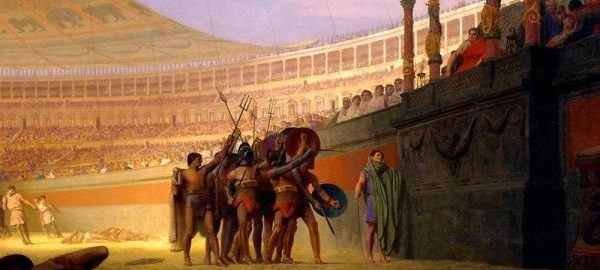“Ave Caesar morituri te salutant!” (“Hail, Emperor, those who are about to die salute you”) – this is a greeting that was to be directed by the gladiators to the emperor before the fight began. But did the gladiator really go out to the arena and say the words?
In fact, this call only concerned a one-off event – naumachia – which was organized in 52 CE on the order of the emperor Claudius in the waters intended for the drainage of the Lake Fucinus. Ancient sources do not mention other games, where gladiators would address these words to the emperor.
This story is reported by Suetonius. The “Rhodesian” and the “Sicilian” fleets were to fight with each other (each consisted of twelve or fifty tertiary ships). Before the start of the clash, the combatants (naumachiarii) said mentioned above words for which Claudius was supposed to answer “aut non” (or not). The convicts understood that the emperor had pardoned them and refused to fight. Claudius had long wondered if they should not be killed (the praetorians armed with catapults and ballistics were placed around the “battlefield”), but eventually he managed to persuade them to fight.
In an unchanged form, the story repeats in “Roman History” of Cassius Dio. Earlier than both of them, Tacitus describes in his “Annales” naumachia on the Lake Fucinus, but said words are not mentioned.
It should be noted that the theory of using this phrase is disadvantageous, first of all, because each of the warriors wanted to gain the greatest fame and domination, which guaranteed worship of the public and increased the chance of regaining freedom. The gladiator was to receive freedom on the basis of the owner’s or the emperor’s decision, but this did not happen often. The liberated fighter received a wooden sword (rudis), symbolizing the end of the gladiator’s life and the beginning of a free life.







